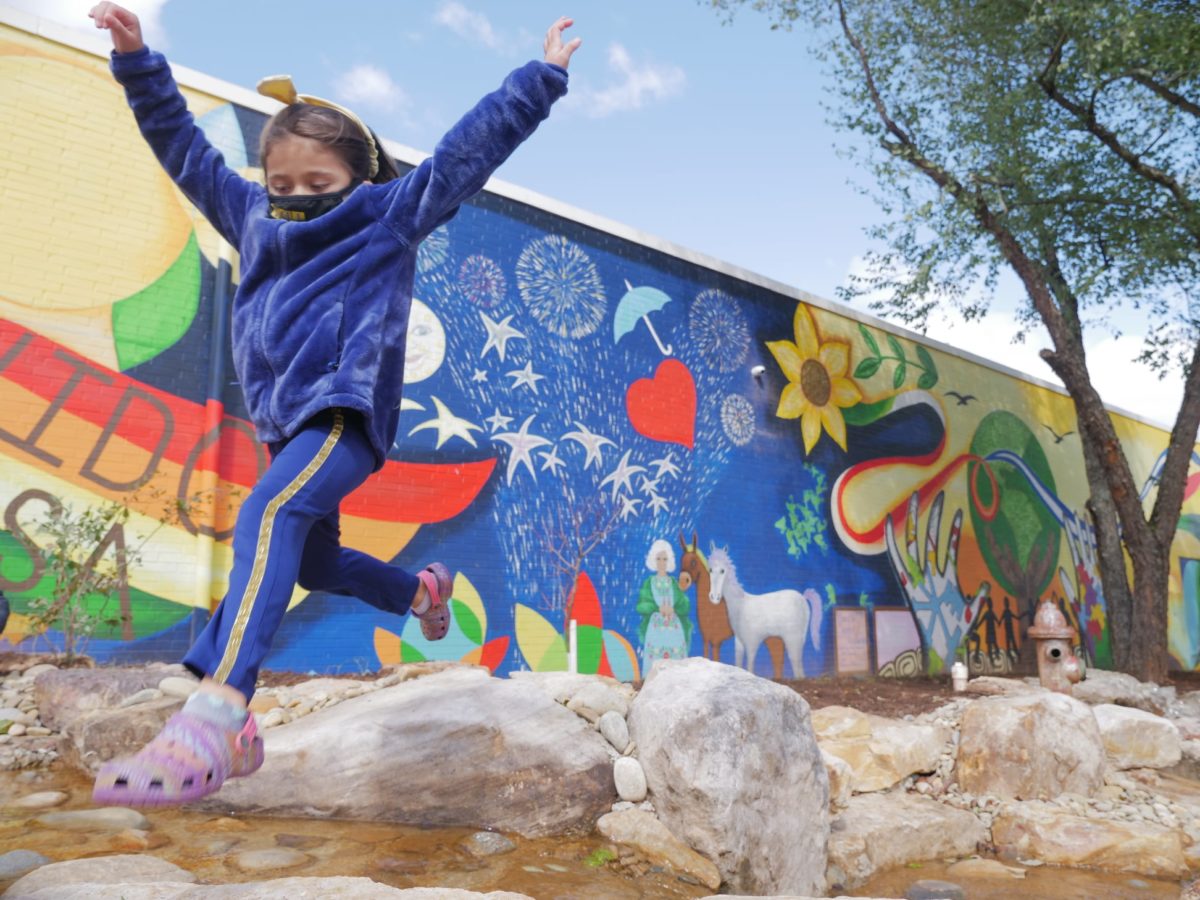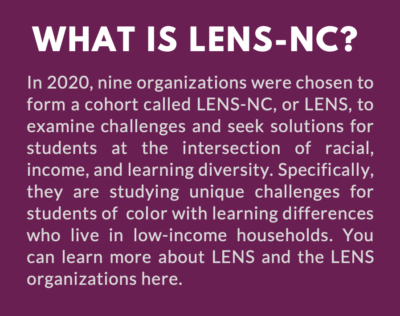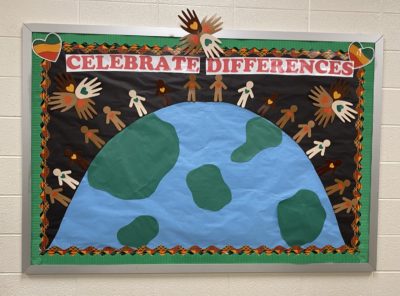

|
|
When families come to El Futuro, they often don’t know a lot about the education system and don’t feel entitled to tell schools what their kids need. They show up at El Futuro, which provides comprehensive mental health services for Latino families, because they need help supporting their kids.
“And so we work with them to find the real problem,” El Futuro Executive Director Luke Smith said. “And then it’s — how do we empower parents who, in their home culture, are used to sending their kid off to school, and receiving their kid when they come home from school, but whatever goes on at the school is whatever goes on in school?”
Participating in Learning for Equity: A Network of Solutions (LENS), several organizations in addition to El Futuro are working to empower parents to engage with their kids’ educational process. The Exceptional Children’s Assistance Center (ECAC) is doing implicit bias training. Immersion for Spanish Language Acquisition (ISLA) is empowering families by educating them about the public school system. And Student U, which works directly with students in middle school and high school, is investing in direct supports to those students’ families.
Helping families to feel comfortable participating in and navigating the education system is not always easy because schools can feel bureaucratic, and getting additional supports for a child with learning differences can be even more confusing.
“In this country, we say, ‘Oh, you can be part of the educational process. We’ll let you do that,'” Smith said. “But then when parents come, we don’t really let them in. And if their kid has a learning difference, it’s like, we’re not going to really tell you about this cryptic system that exists that could support your kid.”
Partnering with parents
El Futuro, a LENS participant, created a program and resources to help families. It first formed a network of 14 experts — eight subject matter experts and, in recognition of their expertise on their kids, six parents.
The network identified key areas where families needed better understanding and support, then conducted a series of five-week classes, compiled a workbook, and created a series of videos aimed at empowering parents to make positive changes both at home and in the schools.
The network also created a guide for educators and healthcare workers to help them “better join with parents and provide support that empower Latinx families who are struggling with ADHD,” Smith said.
The program and resources are designed to build parent knowledge of the education system and bring families into community with one another to offer support and guidance. Both are necessary, Smith said, because the education system isn’t designed to invite families into the process.
Parents report feeling left out of their children’s education. This is particularly true for parents of students with disabilities and parents whose home culture is not the same as that of white Americans, who hold most of the education leadership and teaching positions in North Carolina.
“We haven’t done a good job of engaging parents, in the sense of really, really understanding the parents’ point of view and perspective on many things,” said Sal Terrasi, project director of the Lesley Institute for Trauma Sensitivity. “And it’s not always an easy conversation for educators, especially educational administrators, but it’s a necessary conversation. … The students are the beneficiaries.”
That’s been the experience for families at El Futuro. Throughout the process, parents learned about such things as supporting learning differences at home, how to assert legal rights to get extra support in schools, and how to advocate at the local and state level.
“I love watching these parents progress, because they come in and sometimes they’re defensive and they’re not very divulging,” said Triana Barrios Gutierrez, project manager at El Futuro. “And by the end, they’re asking for advice within this group, giving advice, and then they’re saying, ‘I can’t wait to see you next time.’ Like they want to sign back up.”
Shirleey de la Rosa was one of the first parents El Futuro tapped for its experts panel. She has a child with ADHD, and it was a challenge working with her son’s school to get a 504 plan — and to make sure the school followed it.
“I think many of the parents mentioned that they learned a lot during this process,” she said. “And this really helps us to be able to be empowered, so that we can really accomplish a dream — the dreams that we have as parents and the dreams that we have for our kids.”
Talking about bias
At ECAC, the state’s federally mandated parent training and information center for students with disabilities, the staff made about 20,000 contacts last year with families who needed support for students with learning differences.
This year, as part of the LENS initiative, it has focused on implicit bias training — and how implicit bias can affect how schools view students who need support, and parents who want to help their children.
The process has opened a lot of eyes at ECAC, which is staffed almost entirely by parents of children with learning differences.
“We don’t always see it, but we can make negative judgments based on things that are not our white, middle-class reality,” said ECAC executive director Laura Weber, a white woman. “And that’s whether it is a child or a family who does not speak ‘correct English’ or whether we’re assessing a child who speaks a different language than English at home.”
The work also touches on stereotypes and normalizing conversations about race.
“I know, for some families, it’s a breath of fresh air,” said Karyn Montague, an ECAC program coordinator and parent. “For me, it’s a breath of fresh air knowing, OK, I can talk about it and not be taken as being a stereotypical mad Black mom who’s advocating for her child. We can talk about it, and it is valid.”
ECAC has done formal training on implicit bias for its entire staff, and it now plans to offer training for parents and educators. In the meantime, it is working on a video that calls attention to data suggesting disparate treatment of students of color with learning differences.
The work will continue, Weber said, until it’s fully integrated into the fabric of the organization.
“We are looking at how do we consciously begin infusing this into everything we do — meaning real issues and concepts around why race matters and why we should be having these conversations at multiple levels with schools, school building personnel, school administrators, etc.” Weber said. “It can’t be ignored as a significant factor in all aspects of special education — in all aspects of education, in general, but particularly in all aspects of special education. And I’m committed that we will not ignore it anymore.”
Lifting parent voice
At ISLA, the organization has spent much of its time as a LENS member building the leadership capacity of families — taking more than 50 families through seven workshops to help give them a voice in their children’s education. It’s a complement to one of the organization’s founding missions: to raise student voice.
ISLA was founded to encourage Latinx families to celebrate their culture as a valuable addition to communities and schools. Through its workshops and programs, ISLA reminds families that they are an integral part of the education system.
Parents learn about the school system, the processes for getting support for students with learning differences, and parents’ legal rights under federal education laws like the Individuals with Disabilities Education Act.
“They’re learning about the leadership skills they already have, and they’re learning about their cultural value — the value of their language, the value of their culture in the education system,” said Jenice Ramirez, ISLA’s executive director.
ISLA also created small groups called Padres Isla, which focus on building leadership and advocacy skills. The first cohort had five parents who met regularly and heard from experts. Two of those parent learners became teacher leaders for the next cohort of six parents.
“We want a community who can leverage their power within the education system when they advocate for their students,” Ramirez said. “Because a lot of the time, they’re under the impression that like, ‘No, I can’t complain about me not getting the services that I’m supposed to be getting,’ or ‘No, I’m not allowed to say anything, because this is the way it is.’ Our motto has been that an informed community is an empowered community.”
“Community” is the key word. ISLA’s approach celebrates community and fosters belonging.
“I have witnessed the sense of belonging and care that you need in order to feel welcome and thrive,” said Mary Jones, an ISLA parent and president of its board of directors.
Jones says the work has had an impact on the educators in the community, too.
“To learn together with humility, acknowledging that we all have a learning path to walk, and allowing our community to take their rightful place at the table,” she said. “Not because of being a minority, not because of their weakness or differences, or the lack of English proficiency — but because of their strength, their resilience, and their potential to teach others.”
A personal touch
For Andrea Rodriguez, bilingual families advocate at Student U, the work with students and families is personal. Student U is an after-school and summer program for Black and Latinx students in middle school and high school. Rodriguez works closely with Spanish-speaking families to help them stay involved with schools.
“I know what it’s like to have to interpret for family members to navigate their lack of access to information, and to also navigate sometimes the animosity that comes with language barriers,” said Rodriguez, who interpreted for her family when she was a student. “And I know how difficult it can be for families and how much they want to understand and participate and also be treated with dignity and respect while doing so.”
Student U focuses on individual supports for students. Through LENS, it was able to hire academic coaches to work in small groups with its students who have learning differences. Because students continue with Student U all the way from sixth to 12th grade, staff are able to notice when learning differences go unidentified — or misidentified.
The LENS experience has made staff more aware of potential biases and consequences, Student U learning specialist Alex Turner said.
“I don’t think we used to have that explicit conversation, structurally, with families that this happens frequently,” Turner said. “But we’re starting to have those types of conversations.”
It’s important that families get this information, Turner said, particularly the families Student U serves. Culturally, some of those families are more likely to accept a school’s placement of their child and defer to the school’s authority.
“They know that their student is getting something extra in school, which to a parent is like, ‘Great, that’s what he needs,’” Turner said. “But then it’s helpful for us to share the information that it might not be the right extra something, and there’s a way for the school to figure out if it’s actually supporting him in the right ways or not.”
The key to all of this, according to all four organizations, is respecting family voice — listening and elevating their expertise over their lived experience. It takes an approach similar to the one the State Board advocates for children, Rodriguez said. In this respect, though, it would be called a whole-family approach.
“In general, our community members have a lot of needs and complex situations that they’re trying to navigate,” Rodriguez said. “The pandemic really highlighted this. So I feel like we need to continue to support our families in other areas of their lives, so that they have the time and the ability to work with us in creating more equity within education.”




